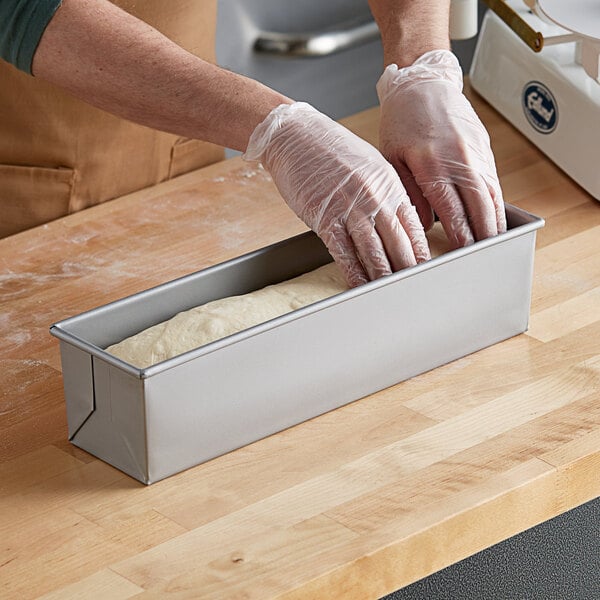We begin on דף נ״ו עמוּד א:
מֵתִיב רָבִינָא: הַלּוֹקֵחַ מִן הַנַּחְתּוֹם, מְעַשֵּׂר מִן הַחַמָּה עַל הַצּוֹנֶנֶת, וּמִן הַצּוֹנֶנֶת עַל הַחַמָּה, וַאֲפִילּוּ מִדְּפוּסִים הַרְבֵּה, דִּבְרֵי רַבִּי מֵאִיר.
רָבִינָא raises an objection from a mishna (Demai 5:3): One who purchases bread from a baker who is unreliable with regard to מְעַשֵּׂר [i.e. the baker is an am ha’aretz] can assume that מְעַשֵּׂר was not taken. As Art Scroll notes, he’s not going to do it for some of his baked good and not others. Either he buys into the premise or not. The bigger chidush is the of statement of רַבִּי מֵאִיר that one may make that assumption even if the bread that he purchases is in different shapes from many molds, indicative that it came from different sources.
For more background on דְּמַאי, or produce about which there is doubt if מְעַשֵּׂר was appropriately taken, see the Jewish Virtual Library entry here.

בִּשְׁלָמָא מִן הַצּוֹנֶנֶת עַל הַחַמָּה, כִּדְרַבִּי אִילְעַאי. דְּאָמַר רַבִּי אִילְעַאי: מִנַּיִן לַתּוֹרֵם מִן הָרָעָה עַל הַיָּפָה שֶׁתְּרוּמָתוֹ תְּרוּמָה? שֶׁנֶּאֱמַר: ״וְלֹא תִשְׂאוּ עָלָיו חֵטְא בַּהֲרִימְכֶם אֶת חֶלְבּוֹ מִמֶּנּוּ״. אִם אֵינוֹ קֹדֶשׁ, נְשִׂיאַת חֵטְא לָמָּה? מִכָּאן לַתּוֹרֵם מִן הָרָעָה עַל הַיָּפָה, שֶׁתְּרוּמָתוֹ תְּרוּמָה
Granted, one may tithe from cold bread for warm bread, in accordance with the opinion of רַבִּי אִילְעַאי, who says: From where is it derived with regard to one who separates teruma from poor-quality produce for superior-quality produce that his teruma is valid as teruma? It is as it is stated: “And you shall bear no sin by reason of it, seeing that you have set apart from it the best thereof” (וְלֹֽא־תִשְׂא֤וּ עָלָיו֙ חֵ֔טְא בַּהֲרִֽימְכֶ֥ם אֶת־חֶלְבּ֖וֹ מִמֶּ֑נּוּ וְאֶת־קדְשֵׁ֧י בְנֵי־יִשְׂרָאֵ֛ל לֹ֥א תְחַלְּל֖וּ וְלֹ֥א תָמֽוּתוּ – Bamidbar 18:32). The Torah warns the לְוִיִם not to separate teruma from low-quality produce. The question arises: If when one separates lower-quality produce, that produce is not קֹדֶשׁ, why would one think that he is guilty of a חֵטְא? He did nothing wrong! From here it is derived that although the לֵוִי acted improperly, in the case of one who separates teruma from poor-quality produce for superior-quality produce, his teruma is valid as teruma.
אֶלָּא אֲפִילּוּ מִדְּפוּסִים הַרְבֵּה, לֵיחוּשׁ דִּלְמָא אָתֵי לְאַפְרוֹשֵׁי מִן הַחִיּוּב עַל הַפְּטוּר, וּמִן הַפְּטוּר עַל הַחִיּוּב
Rather, with regard to the halacha that one may give מְעַשֵּׂר even if the bread is in different shapes from many molds, let רַבִּי מֵאִיר be concerned that the buyer might come to give מְעַשֵּׂר inappropriately. Since these loaves are all דְּמַאי, it is possible that the loaves shaped in one mold were baked from produce on which was מְעַשֵּׂר was given, and the loaves shaped in another mold were baked from produce on which מְעַשֵּׂר not given. Apparently, רַבִּי מֵאִיר rules leniently in cases of דְּמַאי (which are rabbinic law – מִדְרַבָּנָן).
Let’s zoom ahead a bit:
אֶלָּא רָבִינָא, עַד דְּמוֹתֵיב מִנַּחְתּוֹם לְסַיַּיע לֵיהּ מִפַּלְטֵר! דִּתְנַן: הַלּוֹקֵחַ מִן הַפַּלְטֵר – מְעַשֵּׂר מִן כל דְּפוּס וּדְפוּס, דִּבְרֵי רַבִּי מֵאִיר.
But as for רָבִינָא, the question arises: Rather than raising an objection from this case of a baker, from which proof is cited that רַבִּי מֵאִיר does not draw a parallel between rabbinic law and Torah law, let him cite support for the assessment of the opinion of רַבִּי מֵאִיר from the case of a bread merchant [פַּלְטֵר], as we learned in a mishna (Demai 5:4): One who purchases bread from a merchant tithes separately from the bread of each and every mold; this is the statement of רַבִּי מֵאִיר. In this case, רַבִּי מֵאִיר is stringent with regard to דְּמַאי.

אֶלָּא מַאי אִית לָךְ לְמֵימַר? פַּלְטֵר מִתְּרֵי תְּלָתָא גַּבְרָא זָבֵין, נַחְתּוֹם נָמֵי מֵחַד גַּבְרָא הוּא זָבֵין
So why didn’t רָבִינָא cite a proof from this mishna? It is because a merchant purchases his supply from two or three people. Therefore, רַבִּי מֵאִיר holds that one must be concerned that perhaps one of the suppliers separated מְעַשֵּׂר and another did not, so the customer must separate מְעַשֵּׂר from the bread of each and every mold. But if that is the case, רָבִינָא should not cite a proof from the case of the baker, as well; as the baker discussed in the mishna typically purchases his stock of grain from only one person. Therefore, in that case there is no concern that perhaps the customer will take off מְעַשֵּׂר inappropriately.
This leads us to the next Mishnah, for which I’ll leave you with Rabbi Stern to finish the balance.
